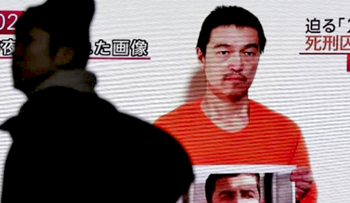Amman (Jordan), Feb 1: The ISIL claims to have beheaded Japanese freelance journalist Kenji Goto held captive by the Takfiri group.

The group released a video on Saturday purportedly showing Goto's decapitation.
The footage shows Goto kneeling, dressed in an orange outfit. A masked man standing beside him with a knife blames the Japanese government for his "slaughter."
It ends with a still photo of the body with the head resting on the back.
The executioner speaks directly to Japanese Prime Minister Shinzo Abe, saying, "Because of your reckless decision to take part in an unwinnable war, this knife will not only slaughter Kenji, but will also carry on and cause carnage wherever your people are found. So let the nightmare for Japan begin."
Grief beyond words
Goto's mother Junko Ishido said, "I can't find the words to describe how I feel about my son's very sad death." "It's deplorable, but Kenji is gone," she said.
Goto's brother Junichi Goto said he had been holding out hope, "But that's not possible anymore."
Japan outraged
Japanese Prime Minister Shinzo Abe voiced outrage over the apparent execution, saying, "I am extremely angry about these heinous and despicable terrorist acts. We will never forgive terrorists."
He added that he was "at a loss for words about the pain that (Goto's) family must feel." "We will cooperate with the international community to make them atone for their crimes."
Reactions
A spokesman for UN chief Ban Ki-moon condemned the "barbaric murder," and said the death "underscores the violence that so many have been subjected to in Iraq and Syria."
US President Barack Obama said in a statement, "The United States condemns the heinous murder of Japanese citizen and journalist Kenji Goto by the terrorist group ISIL."
"Through his reporting, Mr. Goto courageously sought to convey the plight of the Syrian people to the outside world," he noted.
"Our thoughts are with Mr. Goto's family and loved ones, and we stand today in solidarity with Prime Minister Abe and the Japanese people in denouncing this barbaric act."
White House National Security Council spokeswoman Bernadette Meehan said earlier that the United States was working to confirm the video's authenticity.
Moreover, British Prime Minister David Cameron said, "I utterly condemn what appears to be the despicable and appalling murder of Kenji Goto," "It is a further reminder that ISIL is the embodiment of evil, with no regard for human life."
French President Francois Hollande also said he "resolutely condemned the brutal murder of Japanese citizen Kenji Goto by Daesh," using an alternative acronym for the group.
Previous footage
In a recent video posted online, ISIL militants showed the Japanese captive saying he would be killed unless Jordan released a female militant Sajida al-Rishawi, who is thought to be behind an attack on a hotel in Jordan in 2005.
It showed Goto holding the photo of a dead body allegedly belonging to Haruna Yukawa, another Japanese hostage that had been captured by the ISIL Takfiri terrorists.
Goto said in the online footage that if al-Rishawi was not ready for exchange for his life at the Turkish border by Thursday sunset, 29th of January, Mosul time, the pilot Muath al-Kassasbeh would be killed immediately.
However, the beheading footage of Goto included no mention of the Jordanian hostage.
The ISIL extremists have been engaged in crimes against humanity in the areas under their control in Iraq and Syria. They have terrorized and killed people of all communities, including Shias, Sunnis, Kurds, and Christians.
The 47-year-old journalist and filmmaker went to Syria in October reportedly to try to secure Yukawa's release. Yukawa was apparently beheaded after a 72-hour deadline for a USD 200-million ransom passed without payment.






Comments
Add new comment